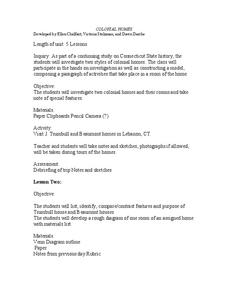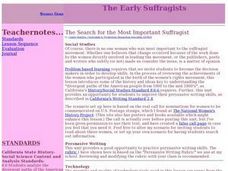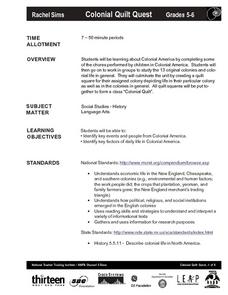Curated OER
Surrealism
Seventh graders research several surrealist artists, e.g. Dali, Magritte, etc., and analyze and compare their styles. They apply their knowledge to their own drawings in pastel of flowers and plants.
Curated OER
Testing the Caverns
Pupils build model caverns using paper mache or clay and bury them in a tray of sand. They test the models by dropping balls onto them to simulate an asteroid hitting the earth. They evaluate the effectiveness of a structure against...
Curated OER
Mathematics in Art?
Fifth graders view prints of M.C. Escher's work. They look at examples of geometric figures and polygons and discuss places they have seen them. Students create their own tessellations. They write a report about the process they used in...
Curated OER
China
Sixth graders become more aware of how land features, climate, and vegtation affect civilization. Students are divided into groups and research one of China's regions. They make a relief of their designated area.
Curated OER
Weather and Seasons
Pupils look through pictures to examine the seasons and seasonal activities which include the Salish months and traditional activities for each month. They also discover why certain activities are done at the same time each year and...
Curated OER
Science Italian Style: Eruption!
Students explore ways scientists prepare for a volcanic eruption. They observe films of earthquakes, oil spills, volcanoes and hurricanes. Students perform activities to demonstrate the relationship of viscosity to lava flow. They...
Curated OER
The Inuksuk: Symbolism and Cultural Identity Lesson Plan
Pupils create their own inuksuk (stone formation). In this Inuit lesson, students discuss the culture of the people and the symbolism behind their inuksuks. They create their own stone formation from outside materials.
Curated OER
Colonial Homes
Students tour colonial homes in Connecticut and compare their features. In this colonial homes lesson, students create a diorama after returning from a field trip to homes. Students use their observations and comparisons to complete the...
Curated OER
Studies of the Eastern Worlds: Japan
Seventh graders, in their study of Japan, examine and discuss the effect the atomic bomb had on Japan. They watch videos and then read the story of Sadako and her magic cranes. They make their own origami cranes and write a paragraph on...
Curated OER
The Early Suffragists
Students research early suffragists in an effort to find the most influential leader of the movement. They give presentations and the class chooses a winner. They write letters to the postmaster suggesting they be placed on a stamp.
Curated OER
A Flag for Mars
Students investigate the historical use of flags on Earth, debate ownership issues for interplanetary exploration, and design a flag for Mars. The implication of placing a flag at a location forms the focus of the lesson.
Curated OER
The ABC's of Walter Anderson
Fifth graders examine how motifs, symbols, and ideas influence various pieces of visual art. They compare and contrast the work of Walter Anderson to pre-historic cave paintings and create a glue line print using motifs and symbols found...
Curated OER
Rock On
Fourth graders create a powerpint presentation to inform their classmates about a selected type of rock. Students are divided into groups to research a particular type of rock. Each group researches their topic using traditional and...
Curated OER
Huichol Yarn Painting
Sixth graders study the Huichol Indians and the art of yarn painting. They create their own yarn paintings in the Huichol style.
Curated OER
Colonial Quilt Quest
Students identify key events and people from Colonial America.
Students identify key factors of daily life in Colonial America.
Students gather and use information for research purposes.
Students create candles in groups following the...
Curated OER
Art, Art, Everywhere
Students create a PowerPoint presentation documenting the art of a chosen artist. After a brief presentation by the instructor, students use the internet to research and document the works and life of their chosen artist. They...
Curated OER
Diplomatic Duties
Tenth graders research and illustrate the diplomatic policies of American presidents, and write letters critiquing the policies of specific presidents. March 17, 2003)
Curated OER
An Investigation Into Our Community
Learners examine maps of Palmer, Massachusetts and practice giving directions. As a class, they discuss how it changed from a farming community to more industrial. To end the lesson, they take pictures of the community to show how it has...
Curated OER
Romare Bearden and the Face Collage
Fourth graders create a collage from magazines and newspapers to create a face. After finishing the face, they use mixed media to complete the background. They write their own description and examine the life and works of Romare Beardon.
Curated OER
Corn Prints and Henri Matisse
Fourth graders observe prints and paintings as the teacher discusses various design elements (repetition, variety, texture, pattern, etc.) used by the artist Henri Matisse. They look at and discuss Indian corn and then make a print that...
Curated OER
Studies of the Eastern Worlds: Cultural Maps
Seventh graders look for similarities and differences in the culture of Eastern World countries by looking at the art from each country. They test their hypothesis and assumptions through further research in the media center. Finally...
Other popular searches
- United States History
- United States Military History
- United States History 1920s
- United States History 1900's
- United States History 1700's
- United States History Essays
- Ap United States History
- Media United States History
- United States Sports History
- United States History K 2
- United States Labor History
- United States History Exam






















